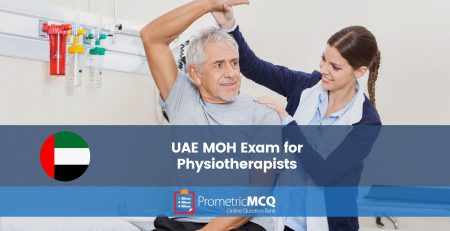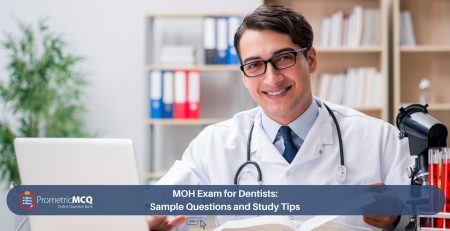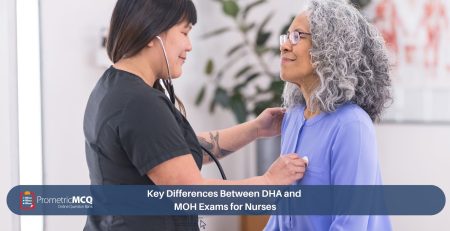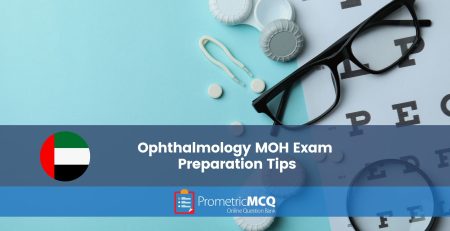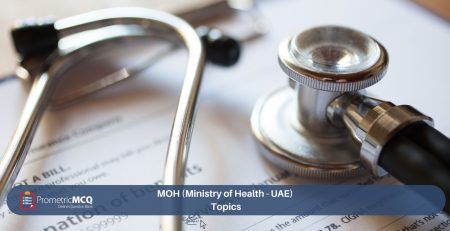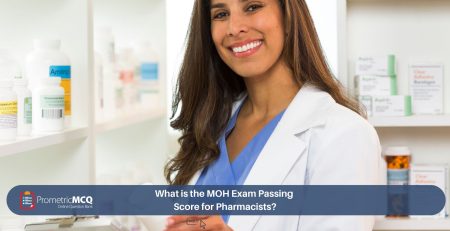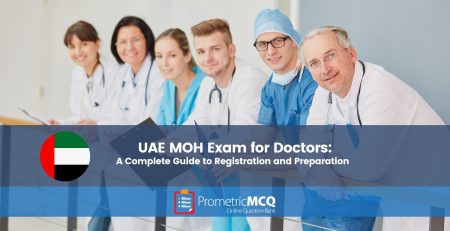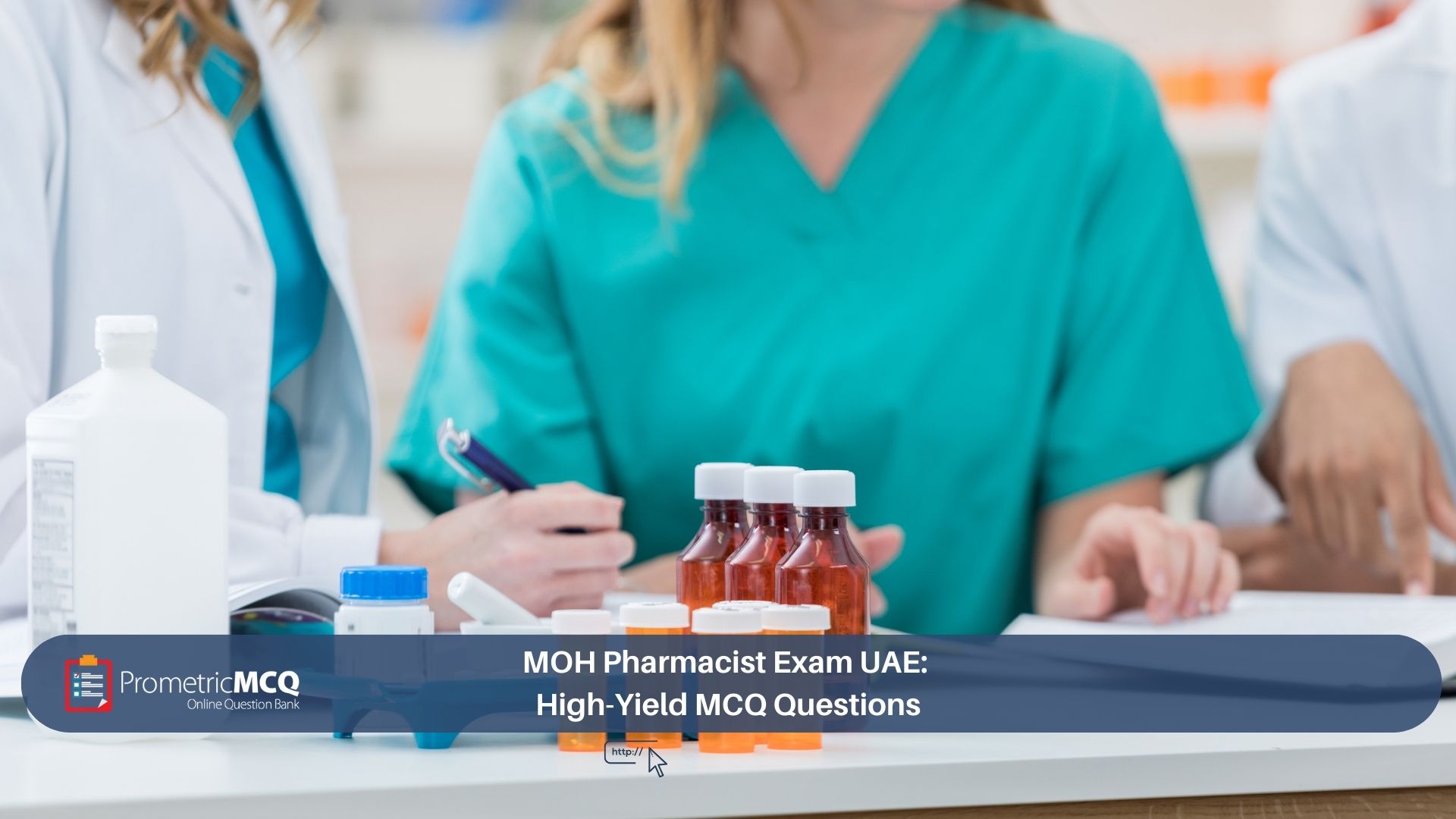
MOH Pharmacist Exam UAE: High-Yield MCQ Questions
fatima@prometricmcq.com2025-09-26T23:45:42+00:00Table of Contents
ToggleMOH Pharmacist Exam UAE: High-Yield MCQ Questions (2025)
The United Arab Emirates stands as a global leader in healthcare, with a system renowned for its innovation, quality, and high standards. For pharmacists seeking to practice in the Emirates of Sharjah, Ajman, Umm Al-Quwain, Ras Al-Khaimah, and Fujairah, the gateway is the Ministry of Health and Prevention (MOHAP) Pharmacist Exam. This rigorous Prometric-administered assessment is the cornerstone of the UAE’s commitment to patient safety, ensuring that every pharmacist possesses the critical knowledge and clinical acumen required to excel in a modern pharmacy setting.
Success on the MOH exam is not a matter of memorizing textbooks. It is a comprehensive test of your ability to apply deep clinical knowledge to practical, case-based scenarios. The exam’s Multiple-Choice Questions (MCQs) are designed to challenge your therapeutic decision-making, your precision in pharmaceutical calculations, and your understanding of both international guidelines and specific UAE pharmacy laws. The most effective path to passing is a preparation strategy centered around mastering high-yield topics and practicing with realistic MCQ questions.
This ultimate 2025 guide has been meticulously crafted to be your definitive resource for the MOH Pharmacist Exam. We will provide a deep dive into the most frequently tested MCQ topics, offer a collection of high-quality sample questions with exhaustive answers and rationales, and break down the complete syllabus. A comprehensive 10-point FAQ section will address your most pressing questions, from exam patterns to licensing procedures. This guide will equip you with the knowledge and strategy needed to conquer the MOH exam and begin your pharmacy career in the UAE.
Key Takeaways for the MOH Pharmacist Exam
- Clinical Therapeutics is Dominant: The majority of the exam focuses on the pharmacotherapy of common chronic and acute diseases.
- UAE Pharmacy Law is Crucial: A unique and heavily tested component is the set of regulations governing pharmacy practice in the UAE, especially for controlled drugs.
- Calculations Demand Perfection: You must be flawless in all pharmaceutical calculations, from dilutions to infusions. This is a high-stakes area.
- Focus on Generic Names: The exam uses generic (non-proprietary) drug names exclusively.
- Active MCQ Practice is the Key: The single most effective study method is solving thousands of case-based questions from a specialized question bank.
Deconstructing the 2025 MOH Pharmacist Exam: Pattern and Syllabus
A strategic approach to your preparation begins with a clear understanding of the exam’s structure and content. Knowing what to expect is fundamental to effective MOH Prometric exam preparation.
Core Exam Framework
- Administrator: Prometric
- Format: Computer-Based Test (CBT) with 100% MCQs.
- Structure: Typically 100-150 MCQs.
- Duration: 2 to 3 hours.
- Scoring: A Pass/Fail result is given. The unofficial passing score is estimated to be around 60-65%. There is no negative marking.
MOH Pharmacy Syllabus: A High-Yield Breakdown
The syllabus is comprehensive, but your study time should be prioritized based on the weight of each domain.
| Pharmacy Domain | High-Yield Topics and Key Concepts for 2025 |
|---|---|
| Clinical Pharmacy & Therapeutics (~50%) | This is the heart of the exam. You need deep knowledge of managing diseases based on the latest international guidelines. Key areas include:
|
| Pharmaceutical Sciences (~20%) | This covers the scientific backbone of pharmacy practice.
|
| Pharmacy Practice, UAE Law & Calculations (~30%) | This section is critical and has unique components.
|
MOH Pharmacy Exam: High-Yield MCQ Questions and Answers
The best way to prepare is to practice with questions that simulate the real exam’s complexity and style. Analyze the following scenarios to understand the level of critical thinking required. For a comprehensive set of practice questions, a dedicated QBank like the MOH Pharmacist Exam MCQs is the most effective tool.
Question 1: UAE Pharmacy Law
A patient presents to your pharmacy in Sharjah with a private prescription for Tramadol 50mg tablets #30, written by a licensed physician two days ago. According to MOHAP regulations for Controlled Drugs (CD), what is the maximum validity of this prescription from the date it was written?
- 1 month
- 14 days
- 7 days
- 3 days
Correct Answer: D (3 days)
Rationale: This question tests a critical piece of UAE federal pharmacy law enforced by MOHAP. Prescriptions for Controlled Drugs (CDs), which include narcotics and psychotropics like Tramadol, have extremely short validity to prevent misuse and diversion. For private prescriptions, the validity is typically only 3 days from the date of issue. This is a frequently tested, must-know fact for any pharmacist practicing in the MOHAP-regulated Emirates.
Why other options are incorrect:
A, B, C: These longer validity periods apply to regular or less-controlled categories of drugs, but not to the strictly regulated CD class. Confusing these is a common and critical error on the exam.
Question 2: Pharmaceutical Calculation
A pharmacist needs to prepare 500 mL of a 20% dextrose solution. The pharmacy stocks 70% dextrose solution and Sterile Water for Injection (0% dextrose). How many milliliters of the 70% dextrose solution are required?
- 143 mL
- 200 mL
- 286 mL
- 357 mL
Correct Answer: A (143 mL)
Rationale: This can be solved using the alligation method or a simple formula (C1V1 = C2V2).
Using the formula (C1V1 = C2V2):
Let C1 = 70% (stock concentration), V1 = the volume we need to find.
Let C2 = 20% (final concentration), V2 = 500 mL (final volume).
(70%) * V1 = (20%) * (500 mL)
70 * V1 = 10000
V1 = 10000 / 70
V1 = 142.857 mL, which rounds to 143 mL.
Question 3: Clinical Therapeutics (Diabetes)
A 58-year-old male with a 10-year history of type 2 diabetes has an A1c of 8.2% despite being on maximum doses of metformin and a sulfonylurea. He also has a history of heart failure with a reduced ejection fraction (HFrEF). According to the latest ADA guidelines, which of the following medications would be the most appropriate to add to his regimen?
- Pioglitazone
- Sitagliptin
- Dapagliflozin
- Insulin glargine
Correct Answer: C (Dapagliflozin)
Rationale: This question requires you to apply guideline-based knowledge for a patient with a specific comorbidity. The American Diabetes Association (ADA) guidelines strongly recommend the use of an SGLT-2 inhibitor (drugs ending in “-gliflozin”) in patients with type 2 diabetes and established heart failure. Drugs like dapagliflozin and empagliflozin have shown significant benefits in reducing hospitalizations for heart failure and improving cardiovascular outcomes, independent of their glucose-lowering effects.
Why other options are incorrect:
A: Pioglitazone is contraindicated in patients with heart failure as it can cause fluid retention and worsen the condition.
B: Sitagliptin (a DPP-4 inhibitor) is considered neutral for cardiovascular outcomes and has a potential warning for heart failure risk. It is not the preferred agent in this scenario.
D: While insulin is effective at lowering glucose, it does not provide the specific cardiovascular and heart failure benefits that SGLT-2 inhibitors do in this patient population.
Frequently Asked Questions (FAQs) for the MOH Pharmacy Exam
While both exams are based on international clinical standards, the key difference lies in the emphasis on local law. The MOHAP exam traditionally places a stronger emphasis on UAE federal pharmacy laws, especially regarding the handling of controlled substances, as these laws apply across the Northern Emirates it governs. The DHA exam may focus more on Dubai-specific health policies. For a complete overview, see our guide on the DHA, MOH, and HAAD exams.
The exam is scored as Pass/Fail. While MOHAP does not publish a specific percentage, the generally accepted passing mark among successful candidates is between 60% and 65%. To pass comfortably, you should aim to score above 75% in your practice tests.
The official MOHAP website is the primary source for regulations. However, this information can be dense. The most effective way to learn is by using a high-quality QBank for the MOH exam, as it will have integrated questions that test these laws in a practical, case-based format, which is how they appear on the actual exam.
The number can vary, but you should be prepared for calculations to make up a significant portion of the “Pharmacy Practice” domain, potentially 10-15% of the total exam. You must be fast and accurate in this section.
They are absolutely essential. The entire clinical therapeutics section of the exam is based on the latest evidence-based international guidelines. Your answers must reflect these standards of care. You can often find summaries of these guidelines on the respective organization’s website, such as the American College of Cardiology (ACC) for clinical guidelines.
Primary Source Verification (PSV) is the mandatory process where the DataFlow Group verifies your credentials (degree, license, experience). It is a requirement for getting your UAE MOH license. It’s highly recommended to start the PSV process at the same time you begin your exam preparation, as it can sometimes take several weeks or months to complete.
The process involves creating an account on the MOHAP portal, submitting your documents for initial review, and then undergoing the PSV/DataFlow process. Once your credentials are in order, you will be issued an eligibility number to book your exam via the Prometric website. A detailed guide can be found on how to apply for the MOH exam for pharmacists.
MOHAP generally allows a candidate three attempts to pass the licensing exam. There is a waiting period between attempts. A failure should be treated as a serious diagnostic tool, indicating a need to fundamentally change your study strategy to be more focused on active learning and MCQ practice.
No, that’s impossible. Focus on the most common and the most serious (life-threatening) adverse effects for major drug classes. For example, you must know that ACE inhibitors can cause a dry cough and angioedema, and that clozapine can cause agranulocytosis.
Do not learn new material. The final week is for consolidation and confidence-building. Review your notes on UAE pharmacy law, re-do all the calculation questions you have, and take one last full-length timed mock exam. In the last 48 hours, prioritize rest, nutrition, and mental calm.
Conclusion: Your Gateway to a Pharmacy Career in the UAE
The MOHAP Pharmacist Exam is a challenging but fair assessment designed to uphold the UAE’s high standards of healthcare. It rewards deep clinical knowledge, precision in practice, and a thorough understanding of the pharmacist’s role in patient safety. By adopting a strategic study plan focused on high-yield topics, particularly clinical therapeutics and UAE law, and by committing to a rigorous regimen of MCQ practice, you can master both the content and the format of the exam. Passing this test is the definitive step toward a rewarding and successful pharmacy career in the thriving Northern Emirates.
Ready to Master the Syllabus and Ace Your MOH Exam?
Our comprehensive MOH Pharmacy MCQ package is specifically designed for the UAE Prometric exam, featuring thousands of clinical cases, calculation problems, and questions on UAE law, all with detailed rationales to guarantee your success.

